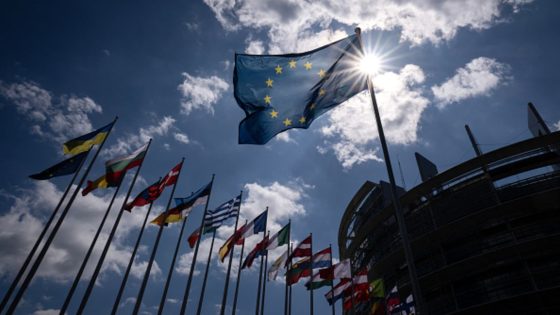This photograph shows European countries’ flags waving in front of the European Parliament building in Strasbourg, eastern France, on June 6, 2024. (Photo by SEBASTIEN BOZON / AFP) (Photo by SEBASTIEN BOZON/AFP via Getty Images)
Sebastien Bozon | Afp | Getty Images
The final, and biggest, day of voting in the European Union elections was underway on Sunday, with millions expected to cast their vote.
Estonians kicked off proceedings with a three-day head start on Monday, and polling stations have since opened across the 27 EU member countries. The majority of votes will be cast on Sunday.
Over 400 million people are eligible to vote for the 720 members of the European Parliament (MEPs). In some countries, this includes young people â the voting age is 16 in Austria, Belgium, Germany and Malta and 17 in Greece. Voter turnout was just above 50% in the last EU election of 2019, according to official data.
Exit polls so far
This year’s election is taking place against a backdrop of growing support for far-right parties in Europe, many of which have also been increasingly successful domestically.
This includes Dutch nationalist Geert Wilders’ anti-immigration party, which recorded significant gains in Thursday’s Netherland’s EU election, according to the latest exit polls. The eight seats expected for the country’s left-wing Labour and Green parties give them only a slight lead over Wilders’ Party for Freedom’s (PVV) seven seats. Wilders also secured a decisive victory in the Dutch national elections last November.
Besides the Netherlands, voting has also already closed in the Czech Republic, Malta, Latvia, Slovakia and Ireland.
EU-wide exit polls are expected out late on Sunday and should provide a strong indication of what the bloc’s parliament will look like for the coming years.
The European Parliament
EU elections take place every five years, with citizens voting for parties or MEPs from their home countries to represent them at the bloc-wide level.
Voting systems differ slightly across countries, but citizens can usually cast their ballot in favor of the same political parties at an EU election as they could during a national election. Parties then form alliances in the EU parliament.
For example, the European People’s Party, which won the most seats in the 2019 EU election, is made up of MEPs from Christian-democratic, liberal-conservative and conservative parties from across the EU.
The 720 MEPs come from all 27 EU countries â the most populous ones elect the most MEPs. Germany holds the top spot with 96 MEPs, while Cyprus, Luxembourg and Malta have the lowest number of representatives, with six each.
MEPs create and decide on laws and regulations across EU member states, addressing social, economic, climate, defense and other issues. One example is the Digital Services Act, designed to address illegal and harmful content online, which tech companies like social media giants must now abide by in Europe.
Analysts are expecting the bloc’s policies to become more protectionist following the election, with defense likely becoming a bigger focus, while climate and environmental policies slip down the agenda.
The European Parliament also plays a role when it comes to the EU’s budget, which it needs to approve and monitor, and elects the president of the European Commission, one of the key roles within the EU.
Source Agencies

